Research Report: 2019
▼ Choose a report:

Powered by Research & Graduate Studies

Powered by Arts and Social Science

Powered by Fine Arts
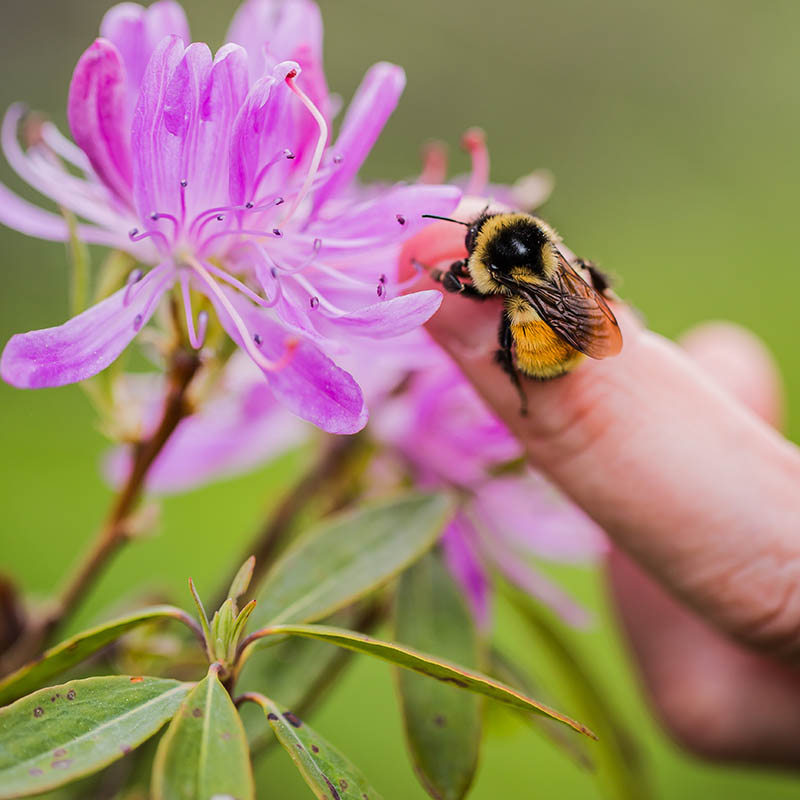
Powered by Science and the Environment
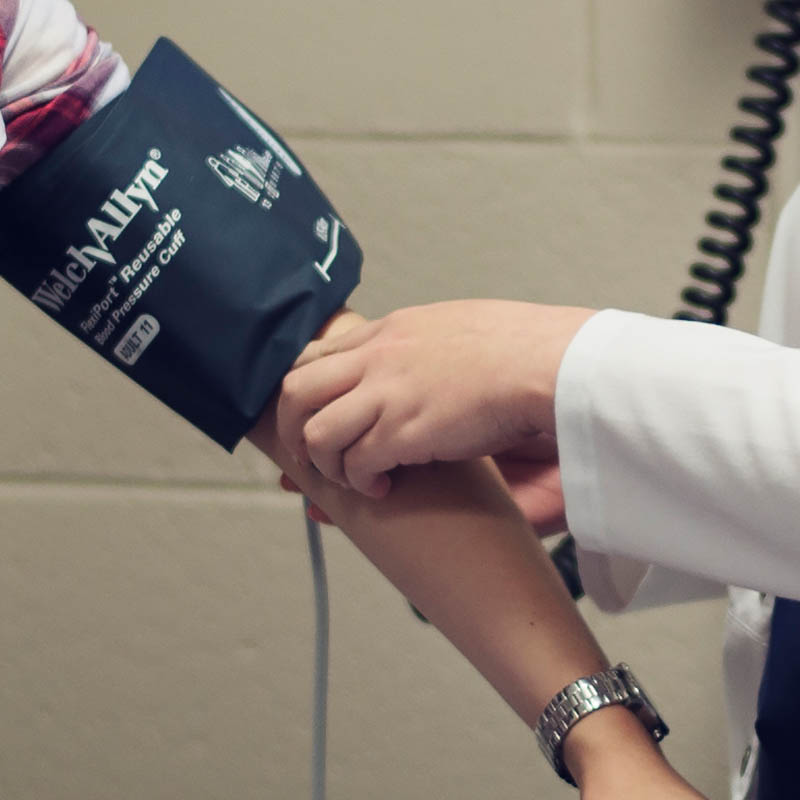

Master of science (BEAS) student Bilal Javed conducted greenhouse experiments using different treatment formulations on ryegrass and kale crops. Submitted photos
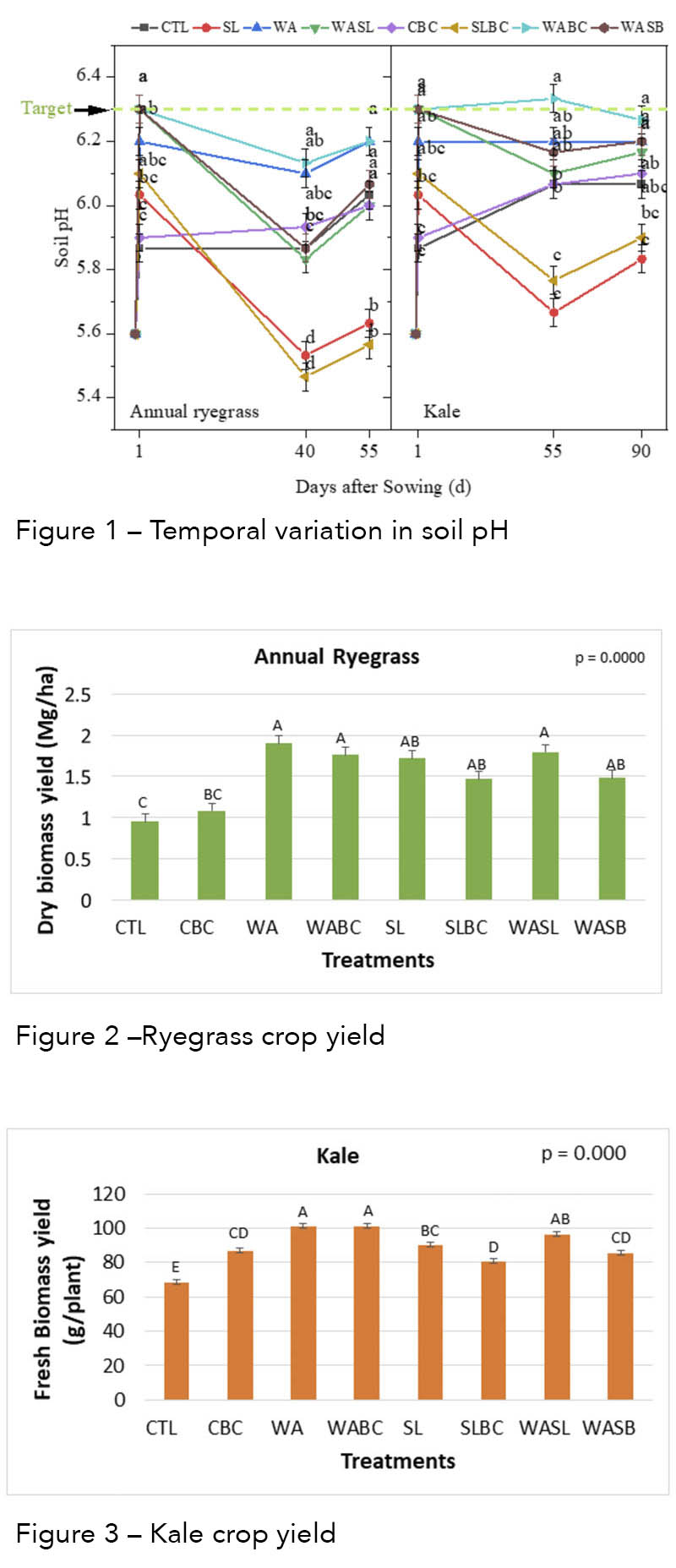
The research of Bilal Javed of Faisalabad, Pakistan, is aiming to convert waste from Corner Brook Pulp and Paper Ltd. into nutrient source for plants and soil. Mr. Javed is pursuing a master of science in boreal ecosystem and agriculture science at Grenfell Campus. His research project is titled “Wood ash and Sludge: Potential Liming and Nutrient Sources for Newfoundland Podzolic Soils.”
Newfoundland and Labrador experiences extreme weather conditions and has acidic and infertile soil in many places in the province, which limits the agriculture industry, which currently produces just 10 per cent of its total food requirement (Source: GovNL). NL soils are predominantly podzolic, characterized as acidic and infertile.
"There is a dire need of certain low-cost organic soil amendments that can be used as alternate liming agent, efficient nutrient source and could enhance soil organic carbon," said Mr. Javed, adding that costs associated with commercial products such as limestone are prohibitive.
According to information he collected from Corner Brook Pulp and Paper Ltd., the mill produces about 10,000 tons of wood ash and 5,000 tons of paper mill sludge as waste annually. Mr. Javed is using those waste products, as well as biochar – a carbon-rich soil amendment – to determine their ability to increase soil productivity.
He conducted greenhouse experiments using different formulations on ryegrass and kale crops: Control (Limestone) (CTL), Wood ash (WA), Sludge (SL), Wood ash and Sludge (WASL), Limetone + Biochar (CBC), Wood ash + Biochar (WABC), Sludge + Biochar (SLBC), and Wood ash + Sludge + Biochar (WSBC) as experimental treatments.
"Treatments had significant effects on soil pH in both crops. WA and WABC were found to be more efficient in increasing pH compared to all other treatments. WA, SL and WASL produced 50 per cent, 45 per cent and 47 per cent more biomass yield in annual ryegrass whereas WA produced 14 percent more biomass yield in kale as compared to CTL treatment," said Mr. Javed. “From these results we can conclude that paper mill wastes are very useful as liming and nutrient source and a cheap alternative input instead of limestone in crop production.”
Results of temporal variation can be seen in Fig 1, results of ryegrass and kale crop yields can be seen in Figures 2 and 3.
Mr. Javed is in the last year of his program; following the completion of his thesis he aims to publish the results of his research.
"My dream is one day this province will be self sufficient for its agriculture production and everyone will be able to purchase inexpensive vegetables," he said. "It will be great if I have a chance to work for this province in agriculture sector and can make my dream true."

Chantal Pennell with "Owl Transition."
It's been a year of firsts for Chantal Pennell.
The Corner Brook visual artist is a member of the first cohort of Grenfell Campus's master of fine arts, and now, the first MFA student to receive a Canadian Graduate Scholarship from the Social Sciences and Humanities Research Council.
"It was an honour to be the first MFA in visual art to undertake this award during my time in the new MFA program at Grenfell Campus," she said.
Ms. Pennell, who is a member of the Qalipu First Nation, also received a Terra Nova Aboriginal Master's Student Scholarship
Her practice has been "responding in kind to natural ways of being by revering the wisdom of the natural world, by engaging with plants, animals and the western Newfoundland landscape using personal, ecological and Indigenous lenses."
As an interdisciplinary artist, she has been exploring mixed media installation for her master's thesis exhibition.
"My process involves photographing moments within the seasonal landscape, noting poetic thoughts about time spent in nature, and drawing by translation using nature-based materials including paper, graphite, birch bark, mineral-based pigments, and handmade paper from local spruce and fir pulp," explained Ms. Pennell.
With respect to the future, she said she is a passionate about her western Newfoundland home, and dismisses notions that being a successful artist means becoming a Canadian artist.
"Curling, Corner Brook is the place I call home – it would truly be an opportunity of a lifetime to become the first local Newfoundland artist with Mi'kmaq heritage and Grenfell alumna to teach at Grenfell Campus, Memorial University of Newfoundland," she said. "In addition, I plan to keep my momentum going as an artist and I hope to take on opportunities as they arise."
Two of Ms. Pennell's peers in the MFA program were also successful in obtaining SSHRC support: Lorna Conquergood and Ani Toole.
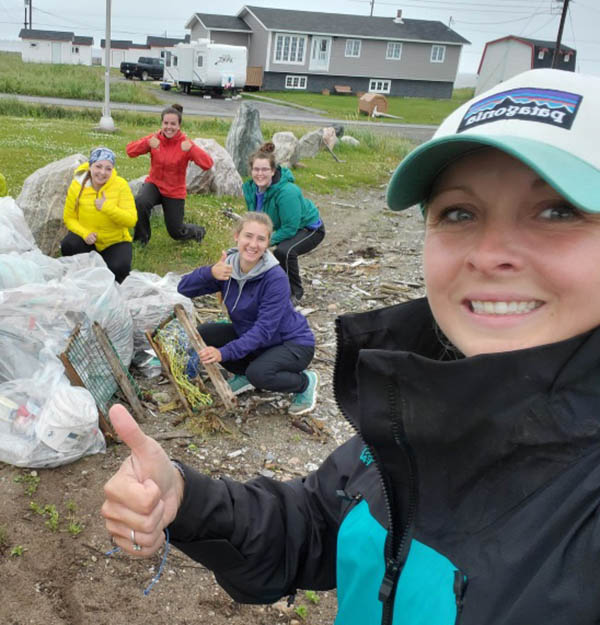
Jackie-Ray Bauman's summer internship for her master of arts in environmental policy landed her in Gros Morne National Park, where she worked alumna Rebecca Brushett, executive director of the Atlantic Healthy Oceans Initiative (AHOI). Here, Rebecca Brushett (foreground) and her AHOI team (Ms. Bauman is directly behind Ms. Brushett) celebrate with a photo after a successful beach clean-up at Back Cove, Cow Head, NL.
The research of Jackie Bauman, a student in the master of arts in environmental policy (MAEP) program, and MAEP graduate Robin Pianosi, concentrates on sustainable marine environments.
Jackie-Ray Bauman's research, titled Marine spatial planning and community capacity on the Great Northern Peninsula, focuses on marine spatial planning, a method used to apply marine conservation targets in order to tackle issues such as resource exploitation and ocean pollution.
"Communities along the Great Northern Peninsula are dependant on marine resources and have varying capacity to respond to ecological changes and to govern their marine and community environments," said Ms. Bauman. "The aim of this research is to understand the most important factors that can allow community assets to be mobilized and to determine how these local capacities can be developed to produce marine spatial planning within local governance structures along the Great Northern Peninsula."
She said marine spatial planning should protect the ecological integrity of ecosystems without superimposing new governance that negatively affects local livelihoods.
"I hope to provide an understanding of what can lead to more successful Marine Spatial Planning for the benefit of coastal communities," she added.
Through her research she hopes to understand the capacity for marine spatial planning to achieve positive conservation outcomes for local communities, including in-depth research in Anchor Point, Main Brook, and Norris Point, and ultimately to share lessons between coastal communities in support of their conservation initiatives and local marine governance.
Ms. Bauman's research will contribute to Coastal Routes, a SSHRC-funded network of researchers, coastal communities, and non-profit organizations united by a mission of supporting sustainable and just coastal livelihoods and places.
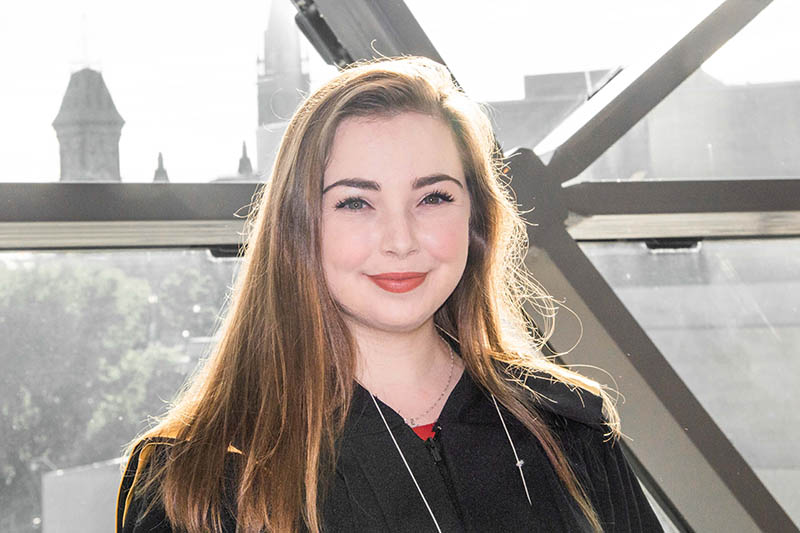
Robin Pianosi. Submitted photo
And Robin Pianosi's research, titled International Engagement with Policy Regulations Relating to Emissions from the Fisheries Industry, formed part of a wider project concerning fisheries sustainability supervised by Dr. Paul Foley. Following her honours bachelor of social science (specializing in international conflict and human rights) from the University of Ottawa, Ms. Pianosi was attracted to Grenfell Campus for her master's studies due to its affordable tuition and small class sizes. Ms. Pianosi examined the degrees of engagement with emissions reduction policies in fisheries from Canadian and international environmental organizations, and concluded that though the degrees of engagement are varied, most of the organizations reviewed do not make statements specifically about reducing emissions from the fisheries and aquaculture industry.
During her time at Grenfell Ms. Pianosi also had the opportunity to work as a graduate assistant on two other projects: Rural Aging-in-Place Policy Solutions, with Dr. Roza Tchoukaleyska, and a project related to drinking water systems in small rural communities with Dr. Kelly Vodden and Dr. Sarah Minnes. For the former, the municipality of Deer Lake was looking for assistance in finding solutions to transportation and housing for aging populations in remote and rural settings.
"All projects I was involved in had very different lenses and scopes, so it was a really valuable experience to be involved on so many levels," said Ms. Pianosi. "Those extra projects were huge value-added pieces. I talk about them in interviews, they inform how I think about my current work, and they were an excellent opportunity for networking. Graduate assistantships allow students to work on extra projects not only help to ease the financial stress of grad school, but they genuinely make the degree more valuable".

A selection of photos from Jackie Bauman's summer. Submitted photos